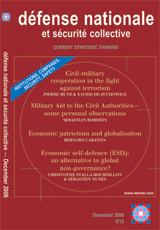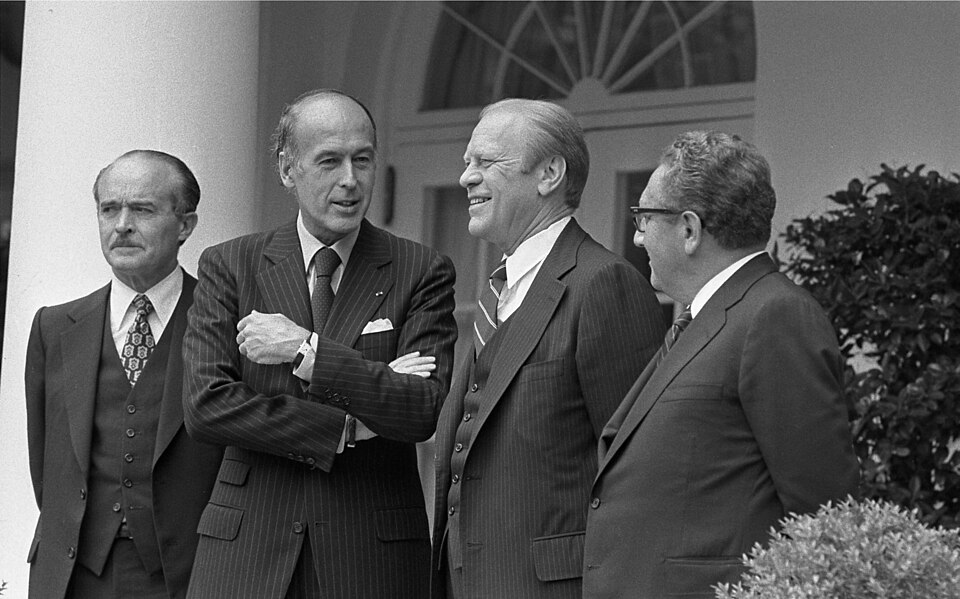Edition anglaise

December 2006 - n° 692
Civil-military cooperation in the fight against terrorism - Pierre Mutz, Xavier Zuchowicz (de)
Civil-military cooperation is permanent. It is particularly well demonstrated in the Vigipirate plan. Although Prefects are responsible for the general coordination of action in the fight against terrorism, the Armed Forces contribute very significantly and visibly in this, particularly in Île-de-France where, at a request from the Prefect of Police/Defence Zone Prefect to the Military Governor of Paris, they intervene in support of the police and gendarmerie forces to protect the population.
Military Aid to the Civil Authorities–some personal observations - Sebastian Roberts
The commander of London District, General Sebastian Roberts, gives an account of the aid given by the military to the civil authorities in times of emergency, either natural or man-made; what the Americans refer to as ‘homeland defence’ is called ‘resilience’ (primarily that of the population) by the British. Mutual knowledge and confidence among the military and civil authorities are its foundations.
A farewell to arms: crisis resolution I - Bruno Cuche
Extracts from the closing address by General Bruno Cuche, Chief of French Army Staff, at the seminar ‘A farewell to arms, anticipating and resolving crises’ held by the CDEF (Forces Employment Doctrine Centre) and the CEIS (European Company for Strategic Intelligence) on 19 October 2006 at the École Militaire, Paris.
A farewell to arms: crisis resolution II - Luc Revel (de)
A résumé of the seminar ‘A farewell to arms, anticipating and resolving crises’ of 19 October 2006 held at the Forces Employment Doctrine Centre (CDEF) and the CEIS (European Company for Strategic Intel
A public security force - Thomas Andreu
The threat has changed. This has led to a concept of overall security, demanding a much closer cooperation between all the security forces. Faced with this need, the first steps towards such a rapprochement have been put in hand. It would seem necessary to go further. This is why it is proposed to break new ground by moving towards the concept of a ‘Public Security Force’. The aim is to bring together the security forces in a network built around certain common focal points. The project, an ambitious one, could be modelled on an existing feature of French defence and security practice: the use of military forces in civil tasks.
The exercise of national maritime responsibilities in the overseas territories - Éric Lefebvre
The task of local coordination of the exercise of national maritime responsibilities (action de l’Etat en mer–‘AEM’), which in mainland France falls to the Préfet Maritime, is one that overseas is assigned to the Government Delegates (‘DDG’). Although they have similar duties, and despite the challenges posed by major national maritime involvement, the DDGs do not have the same structures as the Préfets Maritimes to help them fulfil their roles. A recent change in the law (the decree dated 6 December 2005) has done nothing to bridge this gap. The overseas organisation has, however, seen some significant developments: greater weight is now given to the joint-service command structure and the increased participation of defence resources in AEM tasks, and the senior armed forces commander becomes adviser to the DDG whenever the use of defence assets is involved. The generally simple nature of the system is, however, retained with COMAR (the maritime zone commander), keeping his role as assistant to the DDG. New structural changes are nevertheless essential to improve the coordination that is fundamental to the exercise of national maritime responsibilities overseas.
Economic patriotism and globalisation - Bernard Carayon
A plea for the establishment of an economic and industrial strategy for France and for Europe, and for placing it within the context of economic patriotism.
Economic self-defence (ESD): an alternative to global nongovernance? - Christophe Stalla-Bourdillon, Sébastien Nunes
With globalisation, and the appearance of new powerful nations emerging from a state of under-development (China, India, Brazil, etc.), we are witnessing the birth of non-state powers of global stature which are capable of bypassing, even confronting, nation-states (transnationals, financiers, international crime syndicates, counterfeiters, billionaires, etc.). From ‘refined’, global competition has become grasping, brutal, intensified; businesses are more and more subject to illegal attack. It is right that they should be able to defend themselves. Isn’t it time to give them the legal means to do this? Could economic self-defence be a solution?
Countering the bunker mentality - Éric Delbecque, Jean-Louis Esquivie
Security practices must nowadays adapt to the characteristics of the open society and open economy. They must therefore move on from the temptation to adopt a bunker mentality to the introduction of dynamic security procedures and mechanisms, whose overall philosophy is rooted in the selective, segmented sharing of information, knowledge and skills. This dynamic view of security, accepted as an integral part of wealth creation, is still a new idea.
The chaos of crises, or, the Achilles Syndrome - Lilian Laugerat
Crisis. Everyone knows the word. Everyone avoids the subject. Yet it is part of our everyday life. It does not happen by accident. Organisations of every kind hide behind an outdated logical statistic: crises rarely happen. And yet crises are amplified by the Achilles Syndrome, demonstrating this chronic vulnerability, and transforming every critical event into an acute crisis, leaving no-one untouched. So we need to act, and act methodically. Disordered action only leads to chaos.
The ‘communicative’ company and overall security - Guillaume Tissier
The ‘communicative’ company has gained in competitiveness and productivity, but at the same time has lost in the field of security. The risks are continually multiplying and diversifying: counterfeiting, pirating of programmes, head-hunting of personnel, attempts at destabilisation, etc. A new security structure centred on risk management and economic intelligence is therefore urgently needed if openness is to go hand in hand with security.
Conditions for the successful introduction of biometric travel documents - André Estignard, Pierre Orszag
To increase the level of European security, biometric technology introduced for passports should be extended to visas. Even though the handling and processing of these new documents have been quite adequate, a record of them in trusted files is essential. Otherwise, the management of entries and exits and limiting the time spent within controlled areas are the most effective measures.
How can outsourcing be made secure? - François Lepinoy
In a context of a ever-diminishing defence budgets, and with the creation of a professional army, civilian firms have a new role to play in the development of defence activities. Strong partnerships between defence and civilian companies can reduce operating costs and lead to improved equipment availability.
The senior civil servant and the Armed Forces - Pierre-Henri Argenson (d')
With the ending of national military service, the training of senior civil servants in particular, and the future leaders of the nation in general, no longer includes military experience. This article attempts to evaluate the consequences and the possible risks inherent in this situation for the relationship between the civilian and military authorities, the adaptation of the upper echelons of the civil service to geopolitical developments, and the place of the Armed Forces in the nation’s life. It concludes that a reintroduction of some form of military experience in the training of future leaders is a necessity. Read more
Nucluar proliferation: North Korea muscles in - Pascal Drouhaud
Despite UN Security Council Resolution 1718 of 15 October 2006 establishing an embargo on certain sensitive materials which was adopted a few days after its first nuclear test, the Popular Democratic Republic of Korea (PDRK) seems determined to pursue its nuclear weapons policy. It is betting that the international situation is favourable and allows it the political opportunity to develop a nuclear deterrent. The implication is not only that the regime of Kim Jong Il will then have a ‘sanctuary’, but that the strategic balance of the region will in time be liable to nuclear blackmail from North Korea.
The North Korean crisis and the US-Japanese alliance - Hervé Couraye
An analysis of the North Korean crisis after the recent nuclear test and its regional consequences, in particular with respect to the Japanese-American alliance. A resumed dialogue, which would be in the interests of all, is expected; it must be said that North Korea holds some key cards.
Successes and failures of the NPT: how can nuclear proliferation be curbed? - Colomban Lebas
The nuclear experimentation indulged in by North Korea and the tensions surrounding Iran’s nuclear programme show that the nuclear question, far from having disappeared from the field of international relations with the end of the Cold War, is more than ever in the news. Are the tools for the control of nuclear dissemination still appropriate, or do they merely reflect a vanished world, totally out of kilter with a new strategic situation with which we have not yet come fully to terms? The aim of this article is to show that the NPT, despite its dated aspects, should be retained because it represents the ultimate barrier against uncontrolled proliferation, which would be dangerous for the world. It must, however, be renewed and complemented, in particular by regional agreements and international measures governing fuel supplies.
The world according to RAND - Jean-Philippe Immarigeon
He who would manage the world must be wise to it. So goes the battle cry of those who seek acceptance of their management models, yet their inability to respond to the challenges posed by terrorism, nuclear proliferation, water shortages or pandemics–or quite simply to win the war in Iraq–has rung the death knell of their ambitions. 2005 showed that the deterministic theory had already reached its limits. 2006 will have shown that it has nothing further to propose than walking away from it all.




_astronaut_Sophie_Adenot_(jsc2025e058846_alt).jpg)



